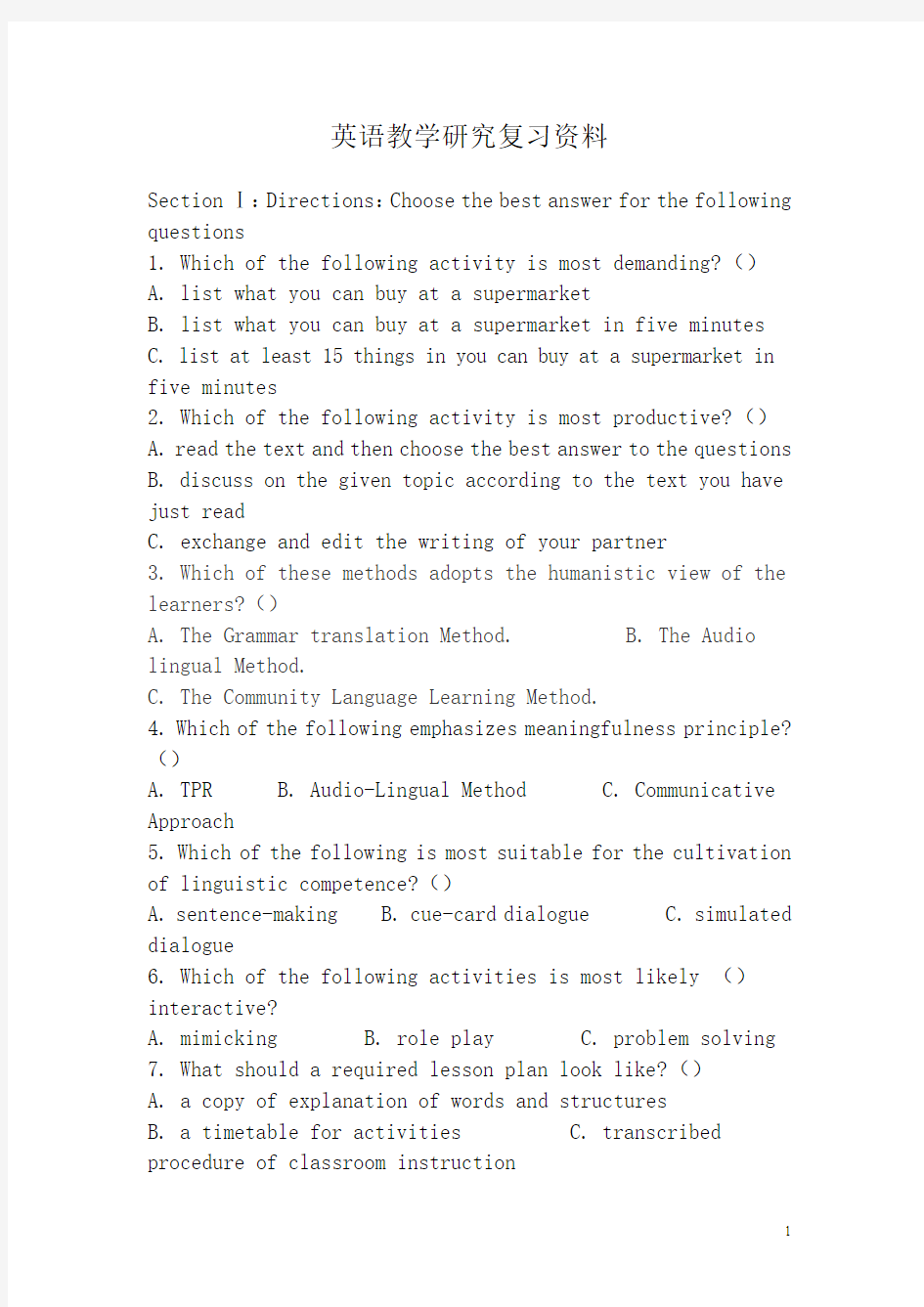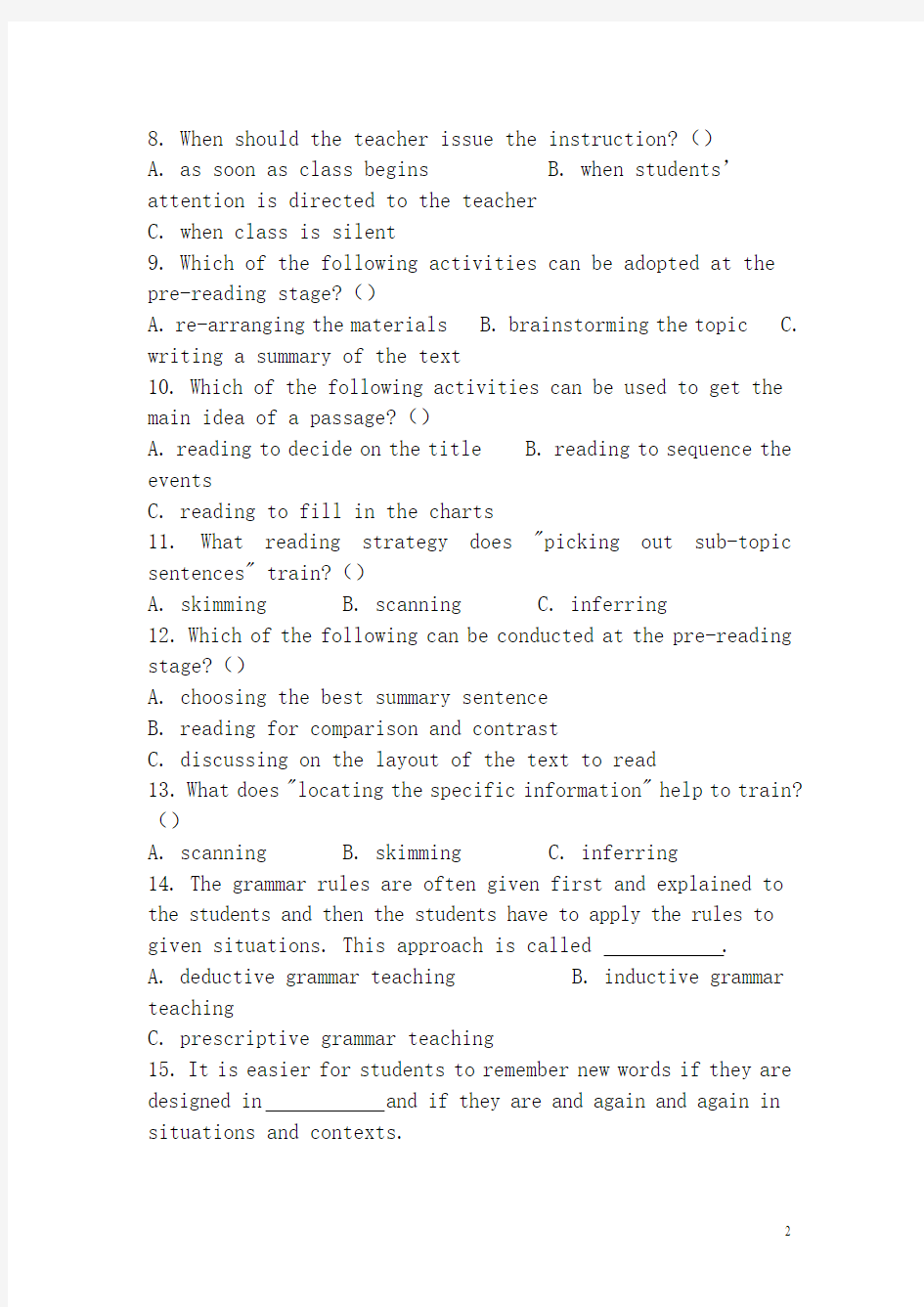英语教学研究方法-电大


英语教学研究复习资料
Section Ⅰ:Directions:Choose the best answer for the following questions
1. Which of the following activity is most demanding?()
A. list what you can buy at a supermarket
B. list what you can buy at a supermarket in five minutes
C. list at least 15 things in you can buy at a supermarket in five minutes
2. Which of the following activity is most productive?()
A. read the text and then choose the best answer to the questions
B. discuss on the given topic according to the text you have just read
C. exchange and edit the writing of your partner
3. Which of these methods adopts the humanistic view of the learners?()
A. The Grammar translation Method.
B. The Audio lingual Method.
C. The Community Language Learning Method.
4. Which of the following emphasizes meaningfulness principle?()
A. TPR
B. Audio-Lingual Method
C. Communicative Approach
5. Which of the following is most suitable for the cultivation of linguistic competence?()
A. sentence-making
B. cue-card dialogue
C. simulated dialogue
6. Which of the following activities is most likely ()interactive?
A. mimicking
B. role play
C. problem solving
7. What should a required lesson plan look like?()
A. a copy of explanation of words and structures
B. a timetable for activities
C. transcribed procedure of classroom instruction
8. When should the teacher issue the instruction?()
A. as soon as class begins
B. when students’
attention is directed to the teacher
C. when class is silent
9. Which of the following activities can be adopted at the
pre-reading stage?()
A. re-arranging the materials
B. brainstorming the topic
C.
writing a summary of the text
10. Which of the following activities can be used to get the
main idea of a passage?()
A. reading to decide on the title
B. reading to sequence the
events
C. reading to fill in the charts
11. What reading strategy does "picking out sub-topic sentences" train?()
A. skimming
B. scanning
C. inferring
12. Which of the following can be conducted at the pre-reading
stage?()
A. choosing the best summary sentence
B. reading for comparison and contrast
C. discussing on the layout of the text to read
13. What does "locating the specific information" help to train?
()
A. scanning
B. skimming
C. inferring
14. The grammar rules are often given first and explained to
the students and then the students have to apply the rules to
given situations. This approach is called .
A. deductive grammar teaching
B. inductive grammar
teaching
C. prescriptive grammar teaching
15. It is easier for students to remember new words if they are
designed in and if they are and again and again in situations and contexts.
A. context, same
B. context, different
C. concept, difficult
16. Which stage of the speaking lesson is least teacher controlled'()
A. Presentation.
B. Practice.
C. Production.
17. Which of the following is a communicative activity?()
A. Listening to the weather broadcast and filling in a form.
B. Listening to the weather broadcast and talking about a picmc.
C. Transferring the information from the weather broadcast into a chart.
18. If you want to present the usage of words, which of the following would you choose?()
A. Diagrams.
B. Picture illustration.
C. Examples.
19.What is the teacher doing in the following in terms of instruction?()
"We've got one more ?minute left, so make sure that you finish your task on time '".
OK, f think it is the time."
A. Ending the task.
B. Evaluating the task.
C. Monitoring the task.
20. What approach treats the students as a whole person, with feelings and emotions?()
A. The Natural Approach,
B. The Communicative Approach.
C. The Humanistic Approach.
21. Which of the following emphasizes meaningfulness principle?()
A. TPR
B. Audio-Lingual Method
C. Communicative Approach
22. Which of the following is most suitable for the cultivation of linguistic competence?()
A. sentence-making
B. cue-card dialogue
C. simulated dialogue
23. Which of the following activities is most likely interactive?()
A. mimicking
B. role play
C. problem solving
24. In which of the following does the teacher assume the role of prompter?()
A. organize students to discuss on the Internet
B. walk around while the students are discussing on the Internet
C. give encouragement and suggestions to smooth the discussion
25. Which of the following activities is communicative?()
A. jigsaw listening
B. sentence making
C. drilling exercises
26. Which of the following activities can be adopted at the pre-reading stage?()
A. re-arranging the materials
B. brainstorming the topic
C. writing a summary of the text
27. Which of the following activities can be used to get the main idea of a passage?()
A. reading to decide on the title
B. reading to sequence the events
C. reading to fill in the charts
28. What reading strategy does "picking out sub-topic sentences" train?()
A. skimming
B. scanning
C. inferring
29. Which of the following can be conducted at the pre-reading stage?()
A. choosing the best summary sentence
B. reading for comparison and contrast
C. discussing on the layout of the text to read
30. What does "locating the specific information" help to train?()
A. scanning
B. skimming
C. inferring
31. Which of the following activities is best for training detailed reading?()
A. drawing a diagram to show the text structure
B. giving the text an appropriate title
C. transferring information from the text to a diagram
32. Which of the following activities represent the top-down approach?()
A. watching related films
B. pre-teaching vocabulary
C. explaining difficult language points in the reading material
33. What type of approach does the student apply to listening according to what he describes?()
When I listen to English, what worries me most is my limited vocabulary. If I come across a new word, 1 stop to think about its meaning and so miss the next part of the speech.
A. Bottom up approach.
B. Top-down approach.
C. Interactive approach.
34. To develop the skill of listening for specific information, the teacher asks students to fill in lhe blanks with the information they hear on the tape. Which stage of listening class is it at now?()
A. Pre-listening.
B. While-listening.
C.
Post-listening.
Section II: Lesson Plan
1、Directions: In this section, you are presented with a short passage. Read the passage and design
three reading activities: one pre-reading activity, one reading activity and one post-reading
activity. The requirement of each activity is as following: ~ Pre-reading: prepare for reading
~ Reading: read to get the main content of the story
~ Post-reading: reformulate the story or make comment
You may follow the table given after the passage. Make sure the three activities are related to each other.
Excuse me, you're sitting in my sent
The train to Beijing ! Yi Wen often dreamed about the train, and about going to the
capital. But here it was in front of him. He looked at his brother.
Don't forget where you crone from, little brother, ' Jin said. 'And watch your bags carefully. '
Yi Wen nodded, unable to speak. This was his first long trip by train at the start of his new life, leaving his village and his home for the last sixteen years.
He held .Jin in his arms. With tears in his eyes, Jilt pushed Yi Wen away. 'Go,brother. Write to us as soon as you get there, OK?'
Yi Wen jumped onto the train. There were people and bags everywhere. He pushed
past them towards his seat.
A young man was sitting in Yi Wen's seat. He was wearing jeans and a very smart jacket, and was smoking a cigarette.
What should he do? Six pairs of eyes looked at Yi Wen, while the man looked out of the window.
'Sir, you're sitting in rny seat. ' Yi Wen said, with a nervous smile. The other people
watched with interest.
The man didn't turn to look at Yi Wen, but just looked out of the window.
'Excuse me, 'I have a ticket with the number of the seat you're sitting in!' Yi Wen said in a stronger voice.
'1 was here first. ' said the man, without moving his head. Although he was sitting down, he looked very tall and strong.
Yi Wen looked at the other passengers .for help. 'But '" ' he started to say.
'But what?' The man turned and looked at Yi Wen. 'I'm not moving. '
Finally a man wearing glasses spoke in a loud voice. ' This young man has the ticket for that seat. You should move. ' Yi Wen felt brave. 'See? Please move. I've got a long way to go. '
' How long?' the young man asked.
To the last stop, Beijing. '
'I'm getting off before you. Then you can have my seat.
'Where is that?' asked Yi Wen.
' Hangzhou. '
Yi Wen thought Hangzhou was far away.
' It's twenty four hours away from here, ' the man with glasses said. Even if it's onl ten minutes, you should move. '
Slowly the young man stood up, looked at Yi Wen and dropped his cigarette on the.floor.
'I'll see you later,' he said, and disappeared down the train.
Activity 1 (Pre-reading)
Activity 2 (Reading)
Activity 3 (Post-reading)
Backup plan:
1. Predicted problems
2. Possible solutions
2、Directions: Read the following two texts carefully and complete the teaching plans.
1. The following is an abstract from Senior Ⅰ, Student Book. Please design a teaching plan with the text.
Please design a teaching plan with the text.
Grammar Noun Clauses as the Appositive
The idea that computers will recognize human voices surprises many people.
The possibility that the majority of the labor force will
1. The following is an abstract from Senior Ⅰ, Student Book. Please design a teaching plan with the text.
Please design a teaching plan with the text.
Grammar Noun Clauses as the Appositive
The idea that computers will recognize human voices surprises many people.
The possibility that the majority of the labor force will work at home is often discussed.
